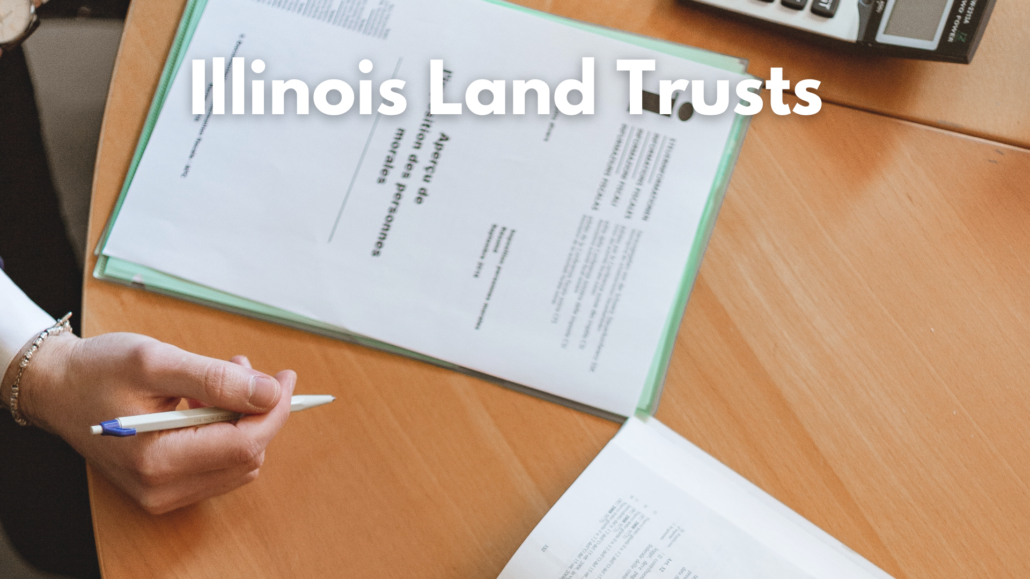
What is a Land Trust?
Buying property is a big investment and Buyers are confronted with a variety of concerns such as privacy of ownership, probate, and asset protection. A land trust is a legal entity with the same constituents of a traditional trust – Grantor, Trustee and Beneficiary – and can help ease a Purchasers’ concerns.
A land trust is a simple and inexpensive method for handling the ownership of real estate. The recorded deed to the real estate is held by a trustee, but all the rights and conveniences of ownership are exercised by the beneficiary.
Uses and Benefits of the Land Trust:
- Anonymity/ Privacy of Ownership– Under a land trust, the identity of the true owner is not made public through the County Recorder of Deeds, meaning that the owner will not be searchable through public record.
- Probate Avoidance– Succession in ownership provided for in the trust agreement will become effective upon death without the expense of probate court proceedings.
- Litigation & Liens– When property is held in a land trust, a recorded judgement against one of the beneficiaries does not automatically constitute a lien upon the real estate held in the trust. Therefore, holding property in a land trust can be an important part of an asset protection strategy.
- Disposing of Part Interest– Beneficial interest under a land trust can be transferred by assignment. The assignment of the beneficial interest eliminates the necessity of transferring ownership by recording a deed.
Ownership and Control Roles within a Land Trust?
Trustees manage the trust, Grantors are the ones who typically buy the property, and Beneficiaries benefit from the trust. Seeing how Grantors are typically the ones living in property, they often are both the Beneficiary and Grantor. It’s important to note that the Trustee has no responsibility nor direct use of the property, but they do hold title of the property. Trustees can be a named individual or an entity, but typically show up as the trust’s number through property searches. Therefore, the Grantors and Beneficiaries remain anonymous through public record. Although the Trustee has no responsibility or use of the land, it is very important a diligent choice is made as Trustees are in charge of orchestrating the trust upon the death of the Grantor.
How do I establish a Land Trust? It’s Easy as One-Two-Three…
- First, the beneficiary must sign a Land Trust Agreement formulated by the Grantor. This agreement will specify who will serve as the Trustee along with important terms such as who has control and management of the property and who will be granted ownership if the Grantor/Beneficiary dies.
- Second, a Deed of Trust, when properly recorded with the County Recorder of Deeds, will transfer the property from the current owner to the name of the land trust.
- Finally, the land trust is born, legal title of the property is held by the Trustee and the Beneficiary can enjoy the land.
Land Trust Key Facts
- Any person or entity that is capable of entering into a contract may establish a land trust– an individual, a group of individuals, a partnership, joint venture, corporation, or limited liability company; or a personal trust.
- Under a land trust agreement, the Beneficiary retains complete control of the real estate in the same manner as if the recorded deed were in his or her name. The Beneficiary may terminate the trust whenever desired and may add additional property to the trust at any time.
- The Trustee executes deeds and mortgages and deals with the property only when directed in writing by the Beneficiary.
Although land trusts were simplified in this article, it takes a knowledgeable and skilled attorney to guide clients through the process. It is imperative attorneys connect with their client to form appropriate trust agreements and follow legal restrictions and guidelines.
In sum, land trusts can be uniquely curated to match a homeowner’s specific needs and protections. It’s important that your attorney has knowledge to provide you with in order to achieve your goals and protection. Contact Tannehill Law LLC to discuss if a land trust is right for you.
Co-Authors: Breanna Raspopovich and Melissa Tannehill

